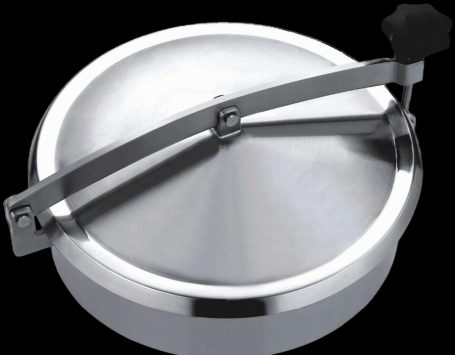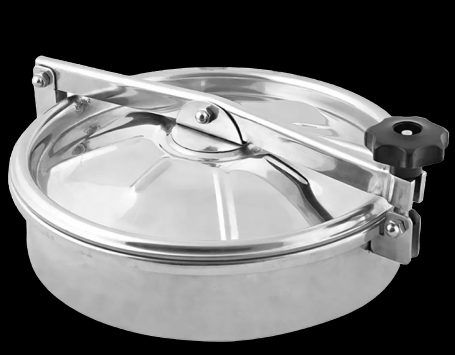Paslanmaz Yuvarlak Menhol Kapak
- Home
- Paslanmaz Yuvarlak Menhol Kapak
Paslanmaz Yuvarlak Menhol Kapak Nedir?
Paslanmaz yuvarlak menhol kapak, özellikle yer altı altyapı sistemlerine erişim sağlamak için kullanılan bir kapak türüdür. Bu kapaklar, paslanmaz çelikten üretildiği için çevresel faktörlere karşı dayanıklıdır ve uzun yıllar boyunca paslanmadan kullanılabilir.
Menhol Kapakların Genel Kullanım Alanları
Menhol kapakları genellikle şu alanlarda kullanılır:
- Belediye altyapısı (kanalizasyon ve yağmur suyu tahliye sistemleri)
- Endüstriyel tesisler (fabrika atık ve drenaj sistemleri)
- Su ve atık su arıtma tesisleri
- Petrol ve gaz endüstrisi
- Gıda ve ilaç üretim tesisleri
Paslanmaz Çelik Menhol Kapakların Avantajları
- Korozyona Dayanıklılık: Su, nem ve kimyasallara karşı yüksek direnç gösterir.
- Uzun Ömürlü Kullanım: Galvanizli veya dökme demir kapaklara kıyasla daha uzun süre dayanır.
- Estetik Görünüm: Parlak ve modern tasarımları sayesinde şık bir görünüm sunar.
- Hafiflik: Bazı modelleri, diğer ağır kapak türlerine göre daha hafiftir ve kolay montaj yapılabilir.
- Bakım Kolaylığı: Temizlik ve bakım süreçleri oldukça basittir.
Paslanmaz Yuvarlak Menhol Kapak Çeşitleri
Paslanmaz menhol kapakları, kullanım alanına ve ihtiyaca göre farklı çeşitlere ayrılır.
Yüzey Tipine Göre Kapak Çeşitleri
- Pürüzsüz yüzeyli kapaklar (Daha estetik ve temiz kullanımlar için)
- Kaymaz yüzeyli kapaklar (Yaya ve araç trafiğinin yoğun olduğu alanlar için)
Yük Dayanımına Göre Kapak Türleri
- Hafif Yük Kapakları (Yaya yolları ve hafif araç trafiği için)
- Orta Yük Kapakları (Kaldırımlar, otoparklar)
- Ağır Yük Kapakları (Yoğun trafik ve endüstriyel alanlar)
Paslanmaz Çelik Seçiminin Önemi
Paslanmaz çelik menhol kapakları 304 veya 316 kalite paslanmaz çelikten üretilir. Peki, hangisini seçmelisiniz?
304 vs. 316 Paslanmaz Çelik Karşılaştırması
Özellik | 304 Paslanmaz Çelik | 316 Paslanmaz Çelik |
Korozyon Direnci | Orta seviyede | Yüksek seviyede |
Tuzlu Suya Dayanım | Düşük | Yüksek |
Kimyasal Dayanıklılık | Standart | Kimyasallara karşı üstün dayanıklılık |
Kullanım Alanı | İç mekanlar, hafif sanayi | Denizcilik, kimya sanayi, ağır sanayi |
Sonuç: Eğer tuzlu su veya kimyasalların yoğun olduğu bir ortamda kullanılacaksa 316 kalite paslanmaz çelik tercih edilmelidir.
Paslanmaz Yuvarlak Menhol Kapak Kullanım Alanları
Endüstriyel Tesislerde Kullanımı
- Kimyasal üretim tesisleri
- Gıda ve ilaç fabrikaları
- Petrol rafinerileri
Şehir Altyapısında Kullanımı
- Kanalizasyon sistemleri
- Yağmur suyu drenaj sistemleri
- Elektrik ve telekom altyapıları
Su Depoları ve Arıtma Tesislerinde Kullanımı
- İçme suyu depoları
- Atık su arıtma tesisleri
- Deniz suyu filtrasyon sistemleri
Teknik Özellikler ve Standartlar
Paslanmaz yuvarlak menhol kapaklar uluslararası standartlara uygun olarak üretilir.
ISO ve EN Standartları
- ISO 9001: Kalite yönetim sistemleri için
- EN 124: Avrupa menhol kapak standartları
- ASTM A240: Paslanmaz çelik plaka standartları
Yük Sınıflandırmaları
- A15: Yaya yolları için
- B125: Otoparklar ve kaldırımlar için
- C250: Orta yoğunluklu trafik alanları için
- D400: Ağır yük taşıyan yollar için
Montaj ve Bakım Süreci
Doğru Montaj İçin Adımlar
- Zemin Hazırlığı: Yüzeyin düzgün olduğundan emin olun.
- Kapak Yerleşimi: Üretici talimatlarına göre montaj yapın.
- Sızdırmazlık Testi: Gerekirse sızdırmazlık kontrolü yapılmalıdır.
Periyodik Bakım ve Temizlik Önerileri
- Kapağı düzenli temizleyin.
- Bağlantı noktalarını kontrol edin.
- Paslanmaz çelik yüzeylere uygun temizlik ürünleri kullanın.
Paslanmaz Yuvarlak Menhol Kapak Fiyatları
Fiyatı Etkileyen Faktörler
- Kullanılan paslanmaz çelik türü (304 vs. 316)
- Kapak kalınlığı ve boyutu
- Yük dayanımı sınıfı
Sonuç
Paslanmaz yuvarlak menhol kapaklar, korozyona karşı dayanıklı, uzun ömürlü ve estetik çözümler sunar. Özellikle endüstriyel tesisler, belediye altyapısı ve su arıtma tesisleri için idealdir. Eğer dayanıklı ve güvenilir bir menhol kapağına ihtiyacınız varsa, paslanmaz çelik kapaklar uzun vadeli bir yatırım olacaktır.
Kaliteli bir paslanmaz çelik kapak 20-30 yıl boyunca rahatlıkla kullanılabilir.
Kapak boyutu, malzeme kalitesi ve yük dayanımı fiyatı etkileyen faktörlerdir.
Eğer doğru şekilde monte edilirse, su sızdırmaz özelliğe sahiptir.
En az EN 124 ve ISO 9001 standartlarına uygun olmalıdır.
Paslanmaz çelik temizleyiciler ile düzenli temizlenmeli ve bağlantı noktaları kontrol edilmelidir.



